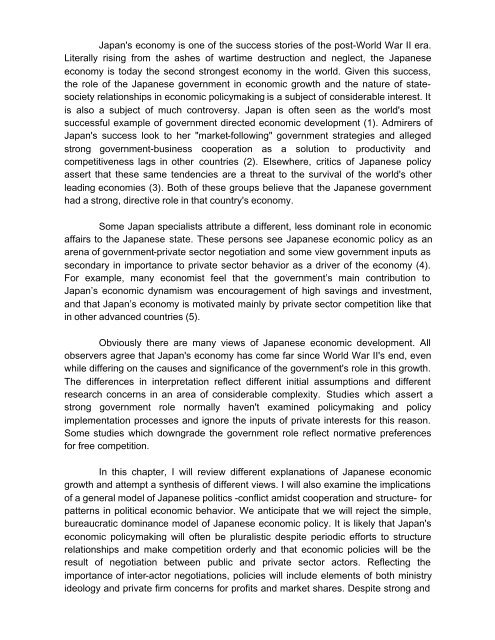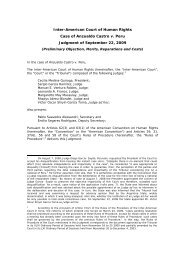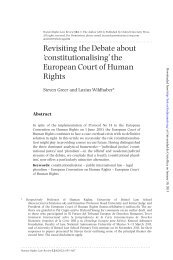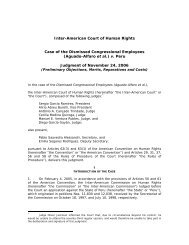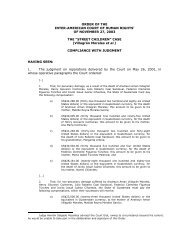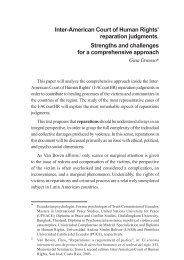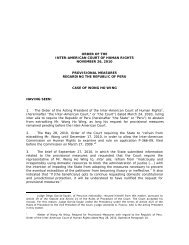The Political Economy of Japan Bradley M. RICHARDSON
The Political Economy of Japan Bradley M. RICHARDSON
The Political Economy of Japan Bradley M. RICHARDSON
- No tags were found...
Create successful ePaper yourself
Turn your PDF publications into a flip-book with our unique Google optimized e-Paper software.
<strong>Japan</strong>'s economy is one <strong>of</strong> the success stories <strong>of</strong> the post-World War II era.Literally rising from the ashes <strong>of</strong> wartime destruction and neglect, the <strong>Japan</strong>eseeconomy is today the second strongest economy in the world. Given this success,the role <strong>of</strong> the <strong>Japan</strong>ese government in economic growth and the nature <strong>of</strong> statesocietyrelationships in economic policymaking is a subject <strong>of</strong> considerable interest. Itis also a subject <strong>of</strong> much controversy. <strong>Japan</strong> is <strong>of</strong>ten seen as the world's mostsuccessful example <strong>of</strong> government directed economic development (1). Admirers <strong>of</strong><strong>Japan</strong>'s success look to her "market-following" government strategies and allegedstrong government-business cooperation as a solution to productivity andcompetitiveness lags in other countries (2). Elsewhere, critics <strong>of</strong> <strong>Japan</strong>ese policyassert that these same tendencies are a threat to the survival <strong>of</strong> the world's otherleading economies (3). Both <strong>of</strong> these groups believe that the <strong>Japan</strong>ese governmenthad a strong, directive role in that country's economy.Some <strong>Japan</strong> specialists attribute a different, less dominant role in economicaffairs to the <strong>Japan</strong>ese state. <strong>The</strong>se persons see <strong>Japan</strong>ese economic policy as anarena <strong>of</strong> government-private sector negotiation and some view government inputs assecondary in importance to private sector behavior as a driver <strong>of</strong> the economy (4).For example, many economist feel that the government’s main contribution to<strong>Japan</strong>’s economic dynamism was encouragement <strong>of</strong> high savings and investment,and that <strong>Japan</strong>’s economy is motivated mainly by private sector competition like thatin other advanced countries (5).Obviously there are many views <strong>of</strong> <strong>Japan</strong>ese economic development. Allobservers agree that <strong>Japan</strong>'s economy has come far since World War II's end, evenwhile differing on the causes and significance <strong>of</strong> the government's role in this growth.<strong>The</strong> differences in interpretation reflect different initial assumptions and differentresearch concerns in an area <strong>of</strong> considerable complexity. Studies which assert astrong government role normally haven't examined policymaking and policyimplementation processes and ignore the inputs <strong>of</strong> private interests for this reason.Some studies which downgrade the government role reflect normative preferencesfor free competition.In this chapter, I will review different explanations <strong>of</strong> <strong>Japan</strong>ese economicgrowth and attempt a synthesis <strong>of</strong> different views. I will also examine the implications<strong>of</strong> a general model <strong>of</strong> <strong>Japan</strong>ese politics -conflict amidst cooperation and structure- forpatterns in political economic behavior. We anticipate that we will reject the simple,bureaucratic dominance model <strong>of</strong> <strong>Japan</strong>ese economic policy. It is likely that <strong>Japan</strong>'seconomic policymaking will <strong>of</strong>ten be pluralistic despite periodic efforts to structurerelationships and make competition orderly and that economic policies will be theresult <strong>of</strong> negotiation between public and private sector actors. Reflecting theimportance <strong>of</strong> inter-actor negotiations, policies will include elements <strong>of</strong> both ministryideology and private firm concerns for pr<strong>of</strong>its and market shares. Despite strong and


